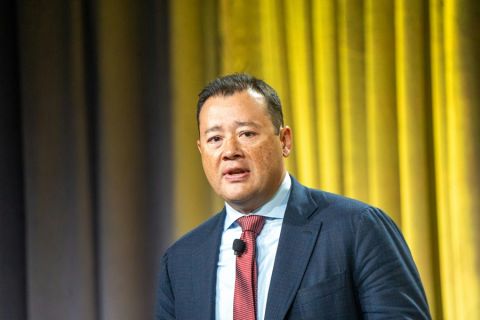
“There is a new world of rivals: a great-power competition between the U.S., Russia and China. Obstacles and problems come with that,” said Daniel Yergin, IHS Markit vice chairman and host of the conference. (Source: Shutterstock.com)
[Editor's note: A version of this story appears in the April 2019 edition of Oil and Gas Investor. Subscribe to the magazine here.]
The theme for this year’s CERAWeek by IHS Markit said it all: “New World of Rivalries.”
Those include the U.S. oil tsunami eroding traditional OPEC market share, U.S. LNG exports competing with other LNG exporters and the U.S.-China trade dispute. Underpinning it all, fossil fuel emissions lead to cleaner renewables and the possibility of government mandates, vs. an industry that has vowed to police itself and contribute to cleaner energy solutions.
There is even a rivalry of sorts in thought, between an increasingly globalized world tied together digitally, where there’s no boundary and no turning back, and rising nationalist or populist sentiment in nearly every country, noted IHS Markit senior vice president Carlos Pascual.
“There is a new world of rivals: a great-power competition between the U.S., Russia and China. Obstacles and problems come with that,” said Daniel Yergin, IHS Markit vice chairman and host of the conference.
Speakers on nearly every panel at the annual Houston event marveled at the global footprint of U.S. shale, which has created heated competition between the U.S. and OPEC. In a closed-door session, according to Bloomberg, people from Carlyle, Morgan Stanley, Credit Suisse, certain producers and OPEC representatives discussed this rivalry. OPEC cautioned against Congress enacting a “NOPEC” act that would allow the U.S. to sue OPEC. This would backfire on American shale companies in a number of ways, including much lower oil prices, if President Trump were to sign it, they warned.
VIDEO - CERAWeek: NOPEC, Carbon Capture, US Shale Capital Outlook
U.S. producers at the event vowed that they will continue, albeit in a more mature way, one that focuses on proper capital allocation, investor returns and environmental stewardship.
Energy Secretary Rick Perry told attendees how excited and proud he is about American innovation, the emission reductions we’ve achieved and what he called America’s new era of energy. “Energy independence used to be a sound bite but now it’s a reality. And, we’ve got more than enough energy to share with the world.”
Hearing someone in a bilateral trade talk lean in and tell him, “We want to buy your LNG,” is music to his ears, he said, admitting to being what he called “a traveling salesman for American energy.”
When asked about the Green New Deal, Perry said, “Having a conversation about it is the right thing to do, and it needs to take place in a polite and thoughtful way. It’s wise for us to have those conversations. We need more open and candid discussion and we need to face reality. We need to support smart technologies that are driving down emissions ... we need to keep saying yes to energy innovations.”
One man saying yes is BP Plc CEO Bob Dudley, who just inked a new joint venture with the Environmental Defense Fund to use drone technology to find and reduce methane emissions. He said we are operating in a world that is no longer sustainable; how the energy industry responds is its future.
“We have to move from being pure-play oil and gas companies into broader energy businesses. Our focus has to be on developing an energy system that is cleaner, better and kinder to the planet,” he said.
RELATED: BP’s Dudley: Oil Industry Can Help Usher In Low-Carbon Future
Dudley endorses low carbon solutions, yet at the same time, he said these must compete for investors’ money. He recalled that BP was in the vanguard more than a decade ago, yet lost millions on its initial green efforts. Despite this, those efforts continue.
“We get our license to operate from society, but we get our capital from investors and it’s our duty to spend it wisely and deliver the returns they expect, both shorter term and long term. In other words, we have to be progressive for society and pragmatic for investors. At the same time, we need to be ready to move fast as the market changes. We’re not the big hulking ocean liners that some see us as.”
Dudley said if we have cleaner energy tomorrow, it will be because we rely on the energy companies of today “incubating new ideas, adopting new innovations and integrating them into their business models and consumer offers.
“We have the relationships, the financial acumen and the engineering know-how to do that at scale and be pivotal in the energy transition. But in order for us to play that role we have to continue to evolve.”
Numerous speakers addressing a variety of energy topics echoed these sentiments about environmental matters and community engagement. Peter Coleman, CEO of Australian LNG exporter Woodside Petroleum, said, “You can’t hide behind government these days to make sure you have access to land rights” when seeking to build pipelines and LNG export facilities. He said companies have to communicate with First Nations, aboriginal groups and local stakeholders. “Citing the economic benefits is not always going to be enough. Think through what the benefits will be and talk with them, not to them and not at them.”
Sound advice as energy companies move forward.
Leslie Haines can be reached at lhaines@hartenergy.com.
Recommended Reading
BKV CEO Chris Kalnin says ‘Forgotten’ Barnett Ripe for Refracs
2024-04-02 - The Barnett Shale is “ripe for fracs” and offers opportunities to boost natural gas production to historic levels, BKV Corp. CEO and Founder Chris Kalnin said at the DUG GAS+ Conference and Expo.

